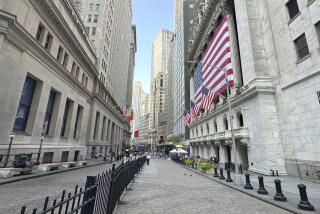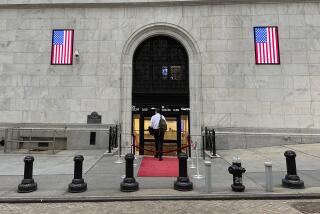PC Makers Expected to Weather Quake Aftershocks
- Share via
SAN FRANCISCO — Computer giant Hewlett-Packard Co. cautioned analysts Friday that it will not meet previously optimistic sales growth estimates. The announcement was one of several signs that large PC makers may lose some of their momentum in the fourth quarter because of component supply problems caused by the Sept. 21 Taiwan earthquake.
But despite a steep decline in share prices for some PC stocks in recent weeks, industry experts see the problems as relatively short-lived.
They expect strong demand to end the industry’s year on an upbeat note but caution that supply shortages could cause prices to rise.
“You could conservatively shave 5% [of profits] off the quarter” due to the quake, said Roger Kay, an analyst with International Data Corp. in Framingham, Mass. “But it’s like having a salutary fast rather than starving to death.” He predicted that spot-market suppliers will be able to fill most companies’ needs--at a premium--during the recovery of Taiwan’s Hsinchu Science-Based Industrial Park factories. Its factories produce much of the world’s supply of memory chips and other PC components.
Higher memory prices “make it harder to sell PCs for the low-end prices we’ve seen, and that low end is the driving force in the market,” said Matt Sargent, an analyst with ZD Infobeads in San Diego.
In August about 47% of all PCs in the U.S. retail market sold for less than $600--an all-time record, Sargent said, adding, “It’s a little scary if we take the gas out of that market.”
But he agreed that other parts suppliers will probably take up the slack and that PC makers themselves may cut their margins to keep prices low and stimulate demand during the crucial holiday buying season.
Companies with the leanest inventories--such as direct-sales leader Dell Computer Corp.--could theoretically suffer the most, because they operate on low inventories to maintain an ability to adapt rapidly to market conditions.
Although Dell shares have dropped slightly since the quake, they rallied Friday, gaining 72 cents to close at $42.53 on Nasdaq. Direct-sales rival Gateway Inc. followed a similar pattern, dropping off in the last two weeks but roaring back Friday--it rose $5.38 to close at $49.38 on Nasdaq, a gain of more than 12%.
Analyst Dan Niles of San Francisco-based BancBoston Robertson Stephens lowered his rating on Dell to “long-term attractive” from “buy” because of concerns that the earthquake will hurt sales.
Other companies are already scrambling to regain the aggressive posture they have enjoyed until recently.
After HP’s announcement Friday, its shares fell $3.38 to close at $87.38 on the New York Stock Exchange, continuing a steep decline since early September.
But analysts say Taiwan is only one of HP’s problems, and perhaps not the biggest.
Chief Executive Carly Fiorina’s forecast comes as HP grapples with slower sales growth in its North American server business. Servers are the powerful computers that manage Internet sites and networks of PCs. HP now expects revenue for the period ending Oct. 31 to rise about 10%, below forecasts that were as high as 13%.
The quake has also affected production at other companies, including Apple Computer Inc. But as with HP, Apple’s problems extend beyond Taiwan. Its sole supplier of central processors for its flagship G4 model, Motorola, cannot keep up with Apple’s demand for the chips, leading the company to warn that earnings for its quarter ended in September will be adversely affected.
Apple shares lost $1.59 on Friday to close at $61.72 on Nasdaq, off 23% from their all-time high of $80.13 reached Sept. 20.
Taiwanese companies produce more than half the world’s supply of motherboards (a PC’s main circuit board) and a large proportion of the chip sets (processors that facilitate communications between components, among other functions), memory chips, and cards that accelerate the display of on-screen graphical images.
Although the giant memory chip makers--UMC Group and Taiwan Semiconductor Manufacturing Co.--are expected to fully recover from quake damage by next week, the prognosis was less clear for smaller makers of other components that PC companies depend on.
According to Niles, even companies such as Micron Technology Inc., the biggest U.S. maker of the memory chips in PCs, could be hurt by shortages in supplies of other parts. That’s because PC companies might choose to slow purchases of memory chips if they can’t get enough of other key components.
Memory chip prices Friday were slightly over $19 for the popular 64-megabyte size, said Paul Meyers of the American IC Exchange in Aliso Viejo, a group that tracks semiconductor markets. That’s down slightly from its recent peak of about $20 last week, but Meyers expects prices to continue to rise next week and notes that major PC manufacturers are actively searching for memory chips on the open market--a sure sign of constrained supply.
*
Bloomberg News was used in compiling this report.






